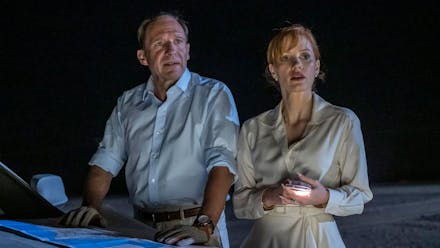The toxicity of white privilege and wealth seems to be having an on-screen moment. From Rian Johnson’s upcoming Glass Onion: A Knives Out Mystery to HBO’s comedy drama The White Lotus to Swedish provocateur Ruben Östlund’s Triangle Of Sadness, stories about the misdeeds and bigotry of the upper classes have become a mainstay of our cultural landscape. The latest work from John Michael McDonagh (The Guard, Calvary) treads similar ground, but with mixed results.

In The Forgiven, the über-rich live out a bohemian fantasy at a castle, or ksar, in the Saharan desert owned by distinguished couple Richard (Matt Smith) and Dally (Caleb Landry-Jones). As guests arrive for the weekend festivities — among them, ageing English bachelors, an American financial analyst, and an array of scantily clad women — the stage appears to be set for a spiky whodunnit. Instead, there is little mystery over who is responsible for the death of Moroccan boy Driss on the dunes leading to the fortress. Drunk and argumentative, guest David (Ralph Fiennes) hits him at full speed with wife Jo (Jessica Chastain) in the passenger seat. They arrive at the party with the unexpected gift of Driss’ limp body in the back.
Combined with a general lack of subtlety and a stiffness to the dialogue, there is a tiredness to the narrative which only grows more fatigued over time.
McDonagh is clearly aiming for caustic satire in a relentlessly crass and damning portrait of the guests’ responses to the killing as the party goes on, and of David’s racism, misogyny and prejudice in a social circle that enables him. But when does such a portrayal stop being an effective critique and start feeling like an enactment of those very same issues? The characters know nothing of the Arab world except their own stereotypes, but do the filmmakers themselves? The veil of comedy in this film feels a little too thin, a little too stretched. Combined with a general lack of subtlety and a stiffness to the dialogue, there is a tiredness to the narrative which only grows more fatigued over time.
As David is sent to repent with Driss’ father (Ismael Kanater) and helper Anouar (an excellent Saïd Taghmaoui) across the desert, Jo leans into all the treats of the luxe life — champagne, cocaine, even fellow guest Tom (Christopher Abbott). Her indifference towards her husband and the boy’s death is clear, no matter what her crocodile tears hope to suggest. It’s a less inventive role for Chastain to play, while Fiennes steps into the redemption arc with poise and depth. Still, what atonement is there to be found for these intolerable people, framed in pretty pictures by director of photography Larry Smith against stunning Moroccan vistas? The deliberate contrast between the ugliness of privilege and the beauty of the film’s slick luxury aesthetic is frustratingly superficial and predictable — only adding to the blandness of the narrative.
